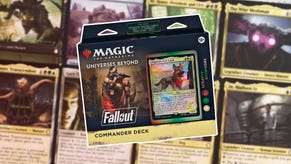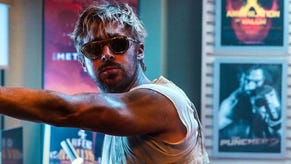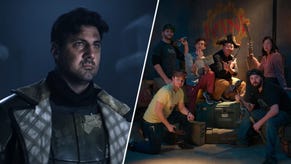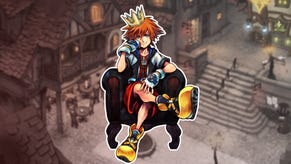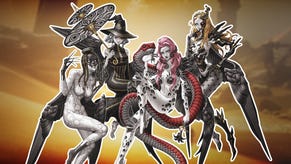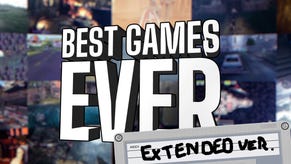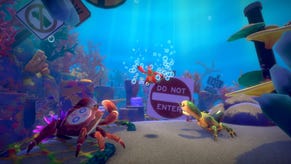Manami Matsumae, the Maestro of Mega Man
COVER STORY: We wrap up our Brave Wave profile with this conversation with one of the label's biggest draws: Mega Man and Shovel Knight composer Manami Matsumae.
This article first appeared on USgamer, a partner publication of VG247. Some content, such as this article, has been migrated to VG247 for posterity after USgamer's closure - but it has not been edited or further vetted by the VG247 team.
USG: Going back to the beginning of Capcom, what was the first game you worked on for Capcom?
MM: My first game was Ide Yosuke no Jissen Mahjong, and then after that, I wrote for Mega Man.
USG: So with that first game, what was that experience like? Coming in, basically learning a lot of new abilities, new skills, in a new role; what was that process like for you?
MM: Yeah, this game came a few months after I'd joined the company. And this was a test by the company given to me – and not just me, but other composers who were in the company at the time, like Junko Tamiya for example. “Can you do what you were asked to study when you joined the company?”
I ended up passing the test [laughs], and that’s when I was assigned Mega Man.
USG: So how did you approach the process of creating music for a mahjong title? Mahjong is such a noisy game, with the “snap-snap-snap” of tiles.
MM: [laughs] I set out to make music that was unobtrusive. And you have a good point — it's a noisy game to play. But when you’re actually playing it, you need to concentrate, and you need to anticipate the other player’s moves, right? So I wanted to make music that wouldn’t impede on the ability of a player to concentrate.
Ide Yosuke, he’s a professional chess player – he should still be alive, but he’s probably very old.
USG: Did he have to sign off on the music, or was he just not really involved in the game at all?
MM: I think the Ide Yosuke collaboration was done by Capcom, I guess their licensing department, and then they had a contract – I guess he was the producer, right? But in terms of interacting with me, nothing.
USG: So you passed the test, and so did you choose to work on Mega Man? Or did they say, “Your music would be great in this game we’re making”?
MM: My manager had actually asked me to join the Mega Man project, which was already in progress — I think the visuals were halfway through, and some of the imagery had already been created. So the game had needed music at that point, and they said, “You passed the test, go please do this game.”
USG: When you heard that the game was going to be called “Rockman,” did you think “Oh, I need to make rock music”?
MM: I had wanted to make rock music, but that wasn’t the exact thing I went out to do. So when I saw how Rockman, or Mega Man, moved on the screen, I was instantly reminded of Astro Boy. And you know, Astro Boy’s kind of a near-futuristic space-oriented comic book, or manga, right? So I wanted to make music that would go well with that kind of rhythm, match the movement of the game, how energetic it was.
As far as the music was concerned, I only had two months to create everything: Sound effects, music... I didn’t have time to deeply, profoundly think about what to make. [laughs] I didn’t even have any chance to do trial and error — it was pretty much all in one go.
USG: Did director Akira Kitamura work closely with you, or did you basically just create music and bring it to him and say, “What do you think?”
MM: I did actually work very closely with Kitamura-san. I had to revise the music at times, to match what he was thinking. Of course, what I was thinking also mattered through the development process, so we did in fact work quite closely together.
USG: Do you still stay in touch with the other creators on that game?
MM: Of course, with Mighty No. 9, I'm in touch with Tom Pon and [Keiji] Inafune-san. Kitamura-san, he just dropped off the face of the Earth.
USG: That’s what I’ve heard, yeah.
MM: Yeah, just for various reasons. He’s not doing games, he doesn’t talk with anyone he worked with back in the day. It's a shame.
USG: But you mentioned Mighty No. 9, so of course you’re working very closely with Mr. Inafune. Are you surprised when you were called in to work on Mega Man 9 and 10, or Mighty No. 9? After all these years, having worked on the series so long ago, to be still doing that so much later...
MM: Yeah, I was definitely surprised that I ended up doing work for Mega Man 9, 10, and Mighty No. 9. It had been many years since I had done the original Mega Man. I worked at Capcom for about four years and then resigned, and I think it was 15 years after that when Mega Man 9 came along.
USG: So did Mr. Inafune and Inti Creates reach out to you, or was it something where you reached out and said, “Oh, I heard you’re working on this game, I’d love to work on it”?
MM: It was Inafune-san who asked for me to join the Mighty No. 9 project. Inti was designated as the developer by that time, so it wasn’t their specific choice, but it was Inafune-san’s choice to bring me on board.
For Mega Man 9, it was Ippo Yamada. You should know who he is, right? Inti’s all made of former Capcom employees.
USG: In fact, I profiled them last year.
MM: [laughs] Okay, good.
USG: If you don’t mind my asking, what made you decide to leave Capcom? Were you just not happy with the work you were doing? Did you want to expand to new horizons?
MM: [laughs] Because I got married.
USG: But you didn’t stop working in video games, after you resigned from Capcom.
MM: Yeah, when I got married, I had to move to Tokyo. That’s exactly why I ended up leaving Capcom, which is an Osaka company. As a freelancer, worked for Konami, ASCII (which is now Kadokawa, SunSoft… yeah, so I had a lot of companies I worked with as a freelancer. But it wasn’t out of any dissatisfaction with Capcom or anything like that.
USG: Just location?
MM: Yeah. By virtue of many of the game companies being in Tokyo, that’s where a lot of the work is, where the money to be made is, and it seems that throughout the industry I had already built a reputation as a reputable music composer. When companies found out I did Mega Man 1, it became very easy to find work in Tokyo as a freelancer.
USG: Did you have any favorite projects that you worked on in your time at Capcom?
MM: Yeah, I mean I did a few projects there, but my favorites were of course Mega Man, Carrier Air Wing. U.N. Squadron of course, and Magic Sword…
USG: Wow, I played all of these games in the arcade…
MM: [laughs] Oh, thank you! Wow…
USG: ...but I didn’t realize back then all these games were composed by the same person! Was the process of working as a freelancer back then different than working with Capcom?
MM: The biggest difference is that when you’re at a company, your working hours are decided, right? At least, back in the day – I don’t know if flex time was a big thing back then. So even if you have to work 9-5, there are some days as a musician when you just can’t make music, like nothing comes to mind and you can’t write anything, so there’d be days when I would just be at my desk, right? [laughs]
Nothing would happen. But as a freelancer, you’re in control of your own time, and you don’t have any working hours, right? So you just write music when it comes to mind. You know, that could happen in the middle of the night, on the weekends, early in the morning… you don’t have to do it within the company’s time, right? And in that sense, there’s no overtime, either.
USG: When you were working as a freelancer, of course, you were writing music, but did you also have to do the programming on it still, or was that something you could hand off and say, “Here’s what I came up with, I leave it to you”?
MM: When I became a freelancer, I was only a composer. If I was doing work for, say, Konami, I’d have someone at Konami go do the programming for the music.
USG: So did you find that more enjoyable, to just be able to focus on the creative aspect of it?
MM: Yeah, exactly. Yeah, I was able to focus on the music part, which was something I liked more.



